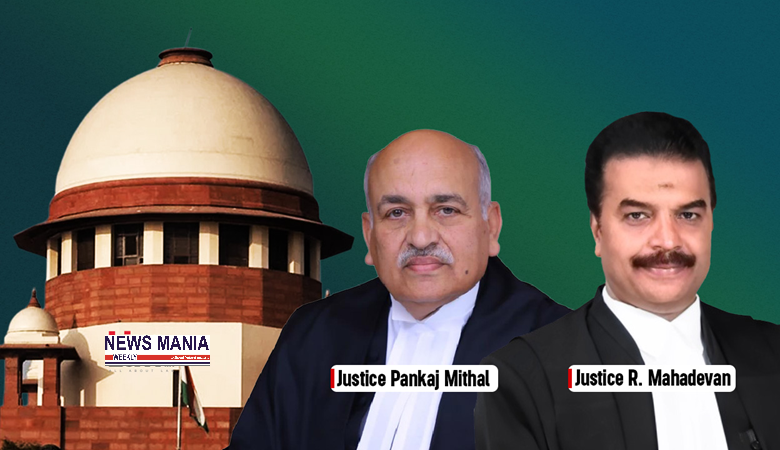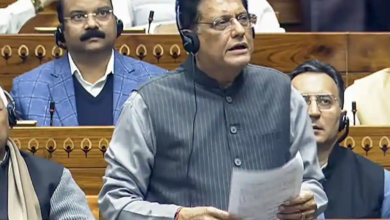Conversion only for reservation, without ‘actual belief’, a fraud on Constitution: Supreme Court

News Mania Desk / Piyal Chatterjee / 27th November 2024
As it upheld a Madras High Court order denying a Scheduled Caste certificate to a Christian woman who claimed to be Hindu while applying for a job as an Upper Division Clerk in Puducherry, the Supreme Court ruled Tuesday that religious conversion simply to obtain quota benefits without “actual belief” in the other religion would defeat the social ethos of the reservation policy.
A bench of Justices Pankaj Mithal and R Mahadevan said that “in the instant case, the evidence presented clearly demonstrates that the appellant professes Christianity and actively practises the faith by attending church regularly”.
“Despite the same, she claims to be a Hindu and seeks for Scheduled Caste community certificate for the purpose of employment. Such a dual claim made by her is untenable and she cannot continue to identify herself as a Hindu after baptism,” the bench said. “Therefore, the conferment of Scheduled Caste communal status to the appellant, who is a Christian by religion, but claims to be still embracing Hinduism only for the purpose of availing reservation in employment, would go against the very object of reservation and would amount to fraud on the Constitution.”
The Supreme Court is currently considering a broader issue about the legitimacy of adopting religion as a criterion for Scheduled Caste quota. In essence, the appeals call for reservations for Dalit converts to Islam and Christianity. Only Hindus are required to have SC status per the 1950 Constitution (Scheduled Castes) Order issued by the President. Sikhs and Buddhists are also regarded as Hindus for reservation purposes. In 2007, Justice Ranganath Mishra Commission report on Religious and Linguistic Minorities, had recommended Scheduled Caste quota for Dalit Christians and Muslims.
Writing for the bench on Tuesday, Justice Mahadevan said, “India is a secular country. Every citizen has a right to practise and profess a religion of their choice as guaranteed under Article 25 of the Constitution. One converts to a different religion, when he/she is genuinely inspired by its principles, tenets and spiritual thoughts. However, if the purpose of conversion is largely to derive the benefits of reservation but not with any actual belief in the other religion, the same cannot be permitted, as the extension of benefits of reservation to people with such ulterior motives will only defeat the social ethos of the policy of reservation.”
Appellant C Selvarani had contested the Madras High Court’s ruling from January 24, 2023, which denied her writ petition. She argued that she is entitled to a concession under the Adi Dravida quota since she is a member of the Valluvan caste, which is covered by the Constitution (Pondicherry) Scheduled Castes Order, 1964, and she is a devout Hindu. Selvarani maintained that she has been drawn to Hinduism since birth and has visited temples to worship Hindu gods.
According to the appellant, she was able to demonstrate through a variety of papers that she was born to a Hindu father and a Christian mother who also began to Hinduism after marriage; her grandparents and great-grandparents were members of the Valluvan caste. She further asserted that her father and brother held SC credentials, that she was treated as a member of the SC community during her whole academic career, and that the transfer certificates confirmed her communal status.
However, the bench which perused the facts of the case said “the report submitted by the Village Administrative Officer, after a detailed enquiry and through the documentary evidence collected” clearly establish that her father belonged to Scheduled Caste community and mother was a Christian and their marriage was performed as per the Christian rituals. It said that “thereafter, the appellant’s father had converted to Christianity through baptism; baptism of the appellant’s brother was done on 07.05.1989; and the appellant was born on 22.11.1990 and she was baptized on 06.01.1991 at Lourdes Shrine, Villianur, Pondicherry within two months”.
“Therefore, it is clear that the appellant was a born Christian and she would not be entitled to claim the certificate under Scheduled Caste category,” it said.
The bench said “the appellant and her family, if they really intended to get themselves converted, ought to have done some positive act to evince such conversion rather than a meek claim to be practising Hinduism”.
“One of the methods of conversion is by adopting a procedure prescribed through the Arya Samaj. A public declaration to the effect of evincing conversion could also have been made,” it said.
The court rejected as “feeble” the woman’s argument that her baptism was done when she was less than three months old, saying “the same does not inspire our confidence as she did not make any attempt to cancel the registration of baptism nor she filed any declaratory suit in this regard”.
The court said that “the field verification clearly revealed the registration of the marriage of the parents of the appellant under the Indian Christian Marriage Act, 1872, the baptism of the appellant and her brother and also the fact that they had been regularly attending the church… There is nothing on record to show that she or her family has reconverted to Hinduism and on the contrary, there is a factual finding that the appellant still professes Christianity”.






